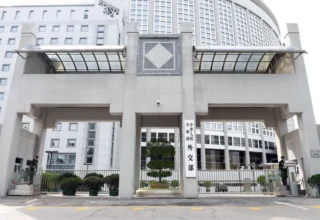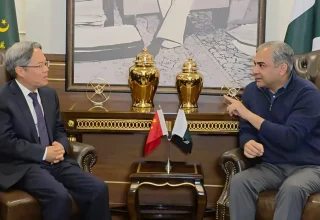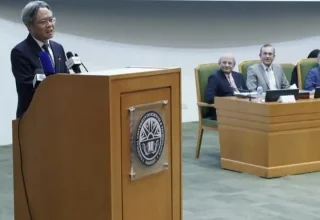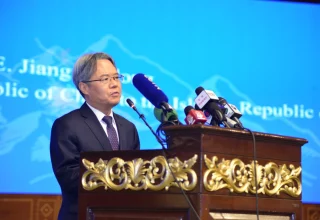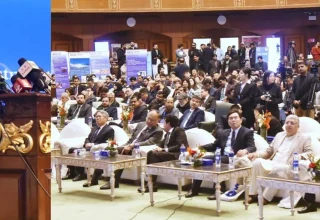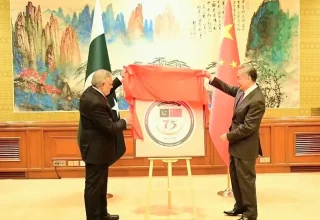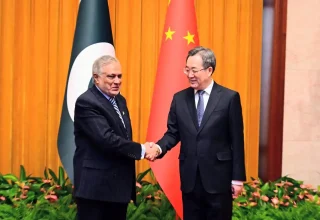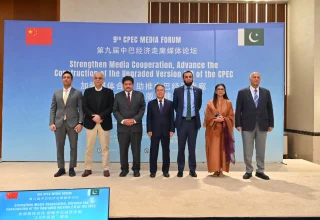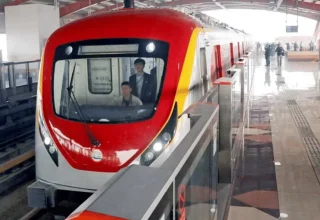
In an increasingly interconnected world, China has emerged as a powerful engine of global connectivity offering practical solutions to bridge development gaps and build shared prosperity. Through flagship infrastructure initiatives such as the China-Europe Railway Express, the China-Laos Railway, the China-Kyrgyzstan-Uzbekistan railway and the China-Pakistan Economic Corridor (CPEC), China continues to reshape regional and transcontinental logistics, energize local economies and deepen global cooperation under the Belt and Road Initiative (BRI).
One of the most emblematic achievements of the BRI, the China-Europe Railway Express stands as a transformative force in trans-Eurasian trade. With routes launched in 128 cities across China, the service now reaches 229 cities in 26 European countries and connects with over 100 cities in 11 Asian countries. This expansive network embodies the vision of mutual connectivity effectively stitching together vast markets and populations.
Train departures now occur as frequently as every 30 minutes, a remarkable feat of logistical efficiency. As a result, the railway express has evolved from a symbolic link to a core artery of economic exchange significantly reducing transportation time and cost compared to traditional sea routes. It is increasingly seen as a strategic “accelerator” for trade and industrial collaboration offering a stable and reliable alternative amid global supply chain uncertainties.
Beyond trade volumes, the China-Europe Railway Express reflects a broader structural shift toward greater economic interdependence. By facilitating the movement of goods ranging from electronics to agricultural produce, it has enhanced the resilience and adaptability of cross-border commerce injecting fresh momentum into the economies of both developed and developing countries.
China’s commitment to enhancing cross-border infrastructure does not stop at the China-Europe corridor. Projects such as the China-Laos Railway and the new western land-sea corridor demonstrate the country’s dedication to fostering regional integration in Southeast Asia and beyond.
These logistics corridors are more than just transport routes, they are catalysts for industrial coordination and economic upgrading. By linking previously isolated or underdeveloped regions to global value chains, they open new pathways for investment, employment and innovation.
For instance, the China-Laos Railway has not only facilitated greater movement of goods and people but has also stimulated tourism, increased local incomes and brought a tangible sense of gain to local communities. Similarly, the construction of the China-Kyrgyzstan-Uzbekistan railway currently underway is expected to further boost regional connectivity in Central Asia, improve trade logistics and serve as a driver for economic modernization across the corridor.
These efforts align closely with the core values of the BRI with shared development, inclusivity and win-win cooperation. Each railway or logistics route constructed under China’s leadership is another step toward a more balanced global economy in which all participants benefit from connectivity and openness.
This transformative potential is more evident in the China-Pakistan Economic Corridor (CPEC), one of the earliest and most comprehensive BRI projects. With a total investment exceeding $25 billion, CPEC has become a cornerstone of Pakistan’s economic development strategy.
Connecting China’s Xinjiang region with Pakistan’s Gwadar Port, CPEC has rapidly evolved into a vital connectivity hub for South Asia, Central Asia and the Middle East. Roads, power plants and industrial zones built under its framework have not only addressed critical infrastructure bottlenecks but have also laid the foundation for long-term industrial and technological collaboration.
Significant progress has been made in both infrastructure and socio-economic development. Energy shortages in Pakistan have been notably alleviated and transportation networks have been significantly modernized, reducing travel times and boosting productivity. More importantly, CPEC has fostered local employment, transferred technology and inspired a new wave of public-private partnerships.
CPEC exemplifies how large-scale cooperation can serve the twin goals of national development and regional connectivity. It has transformed Gwadar into a gateway port that holds the promise of turning Pakistan into a regional logistics and trade hub benefitting not only China and Pakistan but also surrounding regions.
Taken together, these projects highlight China’s role as a constructive and proactive contributor to global connectivity. Rather than being a passive participant in the international system, China is now helping to reshape it through infrastructure, commerce and cooperation.
This transformation is not merely physical. It is economic, strategic and cultural. By narrowing development gaps, creating new trade opportunities and strengthening interdependence, China’s connectivity vision reflects a broader commitment to global peace and prosperity.
Amid global challenges and uncertainties, China’s consistent delivery of high-quality infrastructure projects underscores its credibility and long-term vision. As the Belt and Road Initiative enters its second decade, the world is witnessing high-quality, green and sustainable development further enhancing its global appeal.
With its vast experience, technological strength and inclusive approach, China is well-positioned to continue leading this transformation. From railways to roads, from ports to power grids, the architecture of tomorrow’s connected world is already taking shape and China remains at its foundation.














